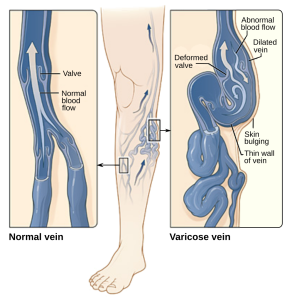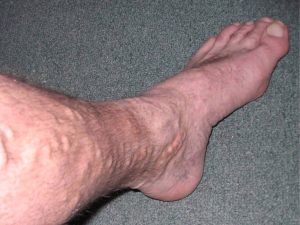When to worry about varicose veins? It is conspicuous how much people tend to forget about their bodies.
What people see outside of their bodies is often what they are also conscious about. Skincare, eye care, pedicure, and manicure are all essential. But people tend to forget about caring for their bodies as a whole.
Veins, the nervous system, and the like are things that people don’t think about very often. Many people get anxious when they have to think about their circulatory system.
But that is a natural thing to think about. People must take good care of their entire bodies. But knowing about veins is essential!
So, when to worry about varicose veins? If the leg skin is discolored or the veins are swollen and hurt too much.
Sometimes people take legs for granted. But any discomfort in the legs can lead to more significant problems. It is always good to check in with a doctor.
Pain, irritation, or discoloration of the legs is no joke. So, seek medical counsel if you are wondering when to worry about varicose veins.
Table of Contents
When to worry about varicose veins?
Varicose veins are normal in bodies. You don’t always have to worry about these veins. These veins are also the veins that people tap into for IVs.
There is a risk of the varicose veins progressing. They can become troublesome if other things in the body are not taken care of. These veins might lead to swelling or rupture under some circumstances.
Those scenarios are not very pleasurable for patients. People might experience different kinds of problems with these veins. They carry more blood, or the circulation is not correctly happening.
That is why you see the veins pop up closer to the surface. They are blue. They are not spider veins you usually see on your forearms, wrists, or legs.
Varicose veins are more common in lower limbs than anywhere else. Hormonal disbalance can lead to varicose veins enlarging.
Weak circulatory performance is also a reason for the varicose veins. If varicose veins are left untreated, then it may lead to a series of complications.
These veins occur in human bodies irrespective of sex, age, or gender. When to worry about varicose veins? When they are causing you problems.

What are Varicose Veins?
Varicose veins are squiggly veins in your feet. These veins are very long and look gnarly.
You can find varicose veins in your legs and feet.
At the same time, the veins are not just native to the portions but the area where you can find them easily. Any superficial veins closer to the surface are varicose veins.
These veins are more predominant in your lower limbs because they absorb the most pressure. While walking, running, or standing, your legs are most stressed. So, the veins are more superficial in those areas.
That is why varicose veins are present in the lower limbs the most. If you are wondering when to worry about varicose veins, that suggests you have leg problems.
You might notice something odd about your leg. Perhaps the skin of your leg is discolored. Or you might see that there is swelling in your leg.
The pain or discomfort due to the swelling causes you sleep loss. It would help if you worried about your varicose veins then.
Varicose Veins in One Leg Only
Varicose veins in one leg only suggest that you are having a problem in that leg alone. The varicose veins mean that your nerves are hurt or damaged.
The damage that your varicose veins in one leg only sustained may be uneven. You can also see the symptoms of the varicose veins much later. The problems you might face due to varicose veins can also be irregular.
For some, the effect is immediate. You will right away notice how close the veins are to your skin. Or you might even see the swelling in your leg.
There can be some pain or mild discomfort before you realize something is wrong. Damage or dysfunctionality causes varicose veins. The pain might make you wonder when to worry about varicose veins.
There is no strict pattern to the development of the varicose veins. So, it can also develop in one leg only. Or you can have varicose veins in both legs.
When to worry about varicose veins? When your leg is causing you pain, you see veins closer to the skin’s surface.
Varicose veins happen when the blood pressure increases in your leg. The veins don’t function properly.
That causes irregular blood flow. And this leads to swelling and pain.

Burst Blood Vessel in Leg – When to worry about varicose veins?
A Burst blood vessel in the leg sounds pretty scary. It can be painful sometimes. A burst of blood vessels in the leg happens when a varicose vein is hurt.
A vein might burst for many reasons—pressure, external trauma or force, or any other reason. Burst blood vessels in the leg indicate varicose veins being damaged.
When to worry about varicose veins if there is a burst vessel? If it causes you pain. You can visibly see the veins in your legs when that happens.
The veins are ropy and blue, and you might see some bruising on the skin.
Regardless of minor or significant bursting of the blood vessels, you will need medical attention. The varicose veins may burst closer to the skin due to many reasons.
Pregnancy
Pregnancy can cause varicose veins to rupture. Pregnancy might be the answer if you wonder when to worry about varicose veins.
If you are pregnant, that means you have a higher volume of blood running through your system. You no longer support a single individual. Your circulatory system also supports the child growing inside.
So, the blood flow is more elevated. This can lead to increased stress on the inferior vena cava. And when that happens, sometimes the pressure may lead to your leg blood vessel rupturing.
Damaged Valves
When to worry about varicose veins? If your valves are damaged or weakened. The circulatory system supports blood flow in your body.
The blood is taken to the heart and then circulates through the body. If the valves of your heart are weak or damaged for some reason, this may lead to the bursting of blood vessels.
Inactivity
Inactivity also answers the question of when to worry about varicose veins. Blood needs to circulate. It can be a problem if you are inactive or the blood does not circulate.
Obesity
Obesity might lead to varicose veins rupturing. Obesity may lead to increased pressure on your veins and body. So, this might be why you have a burst of blood vessels. When to worry about varicose veins? If you are experiencing the abovementioned problems.
Inactivity, obesity, weak valves, and pregnancy are some reasons discussed. There might be another reason you or someone you know is experiencing this.
It is always good to seek medical treatment. Don’t just sit around and worry about your varicose veins. But if possible, go to the nearest hospital for treatment.

Why do my veins hurt?
There can be multiple reasons why your veins hurt. The pain you experience can range from mild to severe. Why do my veins hurt?
That may be due to poor circulation, bacterial infection, or varicose veins. Cellulitis is also known to cause pain in the veins.
Temperature or muscle strain can also lead to your veins hurting a lot.
If the pain you are experiencing is severe, seek immediate medical help. The veins might break in severe cases due to thrombophlebitis or even thromboembolism.
Neither of these scenarios is the best for your overall health. The latter can be pretty intense if left untreated. So, you should seek medical help.
Effects of Vein Pain
Vein pains can be due to multiple reasons. Varicose veins might be one of the reasons. But regardless, the effects of vein pain can be severe as well.
Some complications may arise due to vein pain. These complications are post-phlebitis syndrome, venous insufficiency, myocardial infarction, or symptoms progressing.
These problems may lead to lifelong problems if not treated immediately. Burst blood veins are no joke. Varicose veins are difficult to deal with on your own.
There is not much that you can do. To deal with the adverse effects, the only option you have is to go to the hospital.
Treatments
There are not many treatments for varicose veins. You must seek medical help to deal with varicose veins or burst veins.
One thing you can do is raise your feet. Do it above the heart. This is only a temporary measure. But doing so will help you, for the time being, can do so in many ways.
You can take it and then raise the legs on top of it while sitting. Or you can increase your leg against a wall. Or you can also elevate the leg by placing a few pillows underneath.
That will be of great help. Blood clot or varicose veins feels painful. The pain differs in intensity. It can be very severe or mild.
If you touch your veins that seem swollen, blue against your skin, or painful, seek medical help. Do not try to find remedies for such things at home. Elevating the affected areas is your best bet at home.
But that is in no way the cure.
That is only a temporary respite. Hospital is your best bet by far. However, you can still check on the affected areas to know.
How to check?
If you want to check for blood clots or varicose veins, look for these things if you see your leg or a part being tender.
Suppose there is discoloration on some parts of the skin. Suppose the veins feel painful to touch. Seeing swelling in some places can be indicative of blood clots or varicose veins.
There might be some bruises that you notice on the skin. Exhaustion might be chronic. The entirety of your leg or legs can swell.
Be careful you see any or all of these symptoms. That is the right time to ask – when to worry about varicose veins?
Varicose veins on their own are not something to worry about too much.
Aspirin
It is proven that aspirin might help you a little if you have mild pain. The varicose veins and blood clots pain might be relieved to some extent.
Buying and consuming low-dose aspirin might help you out. But this will be a temporary respite. It is best if you seek medical counsel before taking any medication.
There might be different reactions your body has to medicines. Or blood clot might cause swelling and pain due to various reasons. So, the medication for them might also be different.
So don’t take any undue risks. Seek medical treatment. Aspirin might help, but it won’t cure.
Final Thoughts
You would have answers if you wondered when to worry about varicose veins. Do you also have answers to things like why do my veins hurt?
Or burst a blood vessel in the leg or even varicose veins in one leg only. These questions are widespread. It is natural to ask if you are going through something like this.
Don’t worry too much about how challenging or scary it might seem. Seek a doctor or go to a hospital. Technology and medicinal innovations have made medical treatment revolutionary.
You can easily have tests done and then the proper medication. You don’t have to sit back at home and be anxious. Varicose veins are not always harmful.
Many people have it, and they still live without pain. But if your varicose veins are giving you trouble, then seek treatment.
Blood clots, bursting of blood vessels, or varicose veins might cause swelling, discoloration, or pain.
These medical conditions are related to one another but not synonymous. They may require different medication, therapy, care, and handling.

